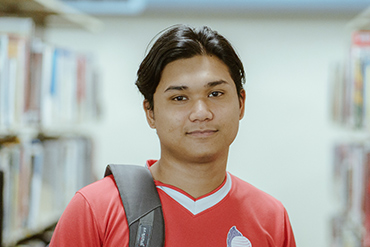Entry Requirements
Academic Entry Definitions
Students must meet minimum entry requirements to study at CIT (these requirements will vary depending on your course and country of origin):
- ACT Year 10 or equivalent*
(A copy of your award and results are required);
OR
- ACT Year 12 Senior Secondary Certificate or equivalent*
(A copy of your award and results are required)
*Students can still apply to study at CIT prior to receiving their certificate; however, acceptance cannot be confirmed until International Student Services Unit has received a copy of the certificate.
Adult Entry
Adult entry is available for DoHA low risk evidentiary level candidates aged 20 or over. Applicants must provide evidence of current or most recent employment.
Your Curriculum Vitae (CV) should include full employment and educational history, including dates and positions held for at least the last five years. Adult entrants are still required to meet all student visa criteria as set by DoHA.
Please note: Eligibility for Adult Entry is determined by course entry requirements in conjunction with your country of origin requirements as set by DoHA.
For more information, visit the Department of Home Affairs website at: https://immi.homeaffairs.gov.au/visas/getting-a-visa/visa-listing/student-500
CIT English Tests
The Versants English test is available to DoHA low risk evidentiary level applicants who are applying through a CIT Education Agent.
The Versants test is taken online and can take up to one hour. This test assesses your reading, writing, speaking and listening skills. These tests are another way to determine your current level of English.
Contact us to find out how to sit the Versants English Placement Test.
English Language Requirements
CIT recognises a number of English language tests as meeting the Institution’s English language requirements including:
- IELTS - International English Language Testing system - www.ielts.org
- IELTS Academic, including One Skill Retake (OSR) www.ielts.org
- IELTS General Training, including One Skill Retake (OSR) www.ielts.org
- TOEFL iBT - Test of English as a Foreign Language - Internet based test - www.ets.org/toefl
- Cambridge C1 Advanced Test (C1 Advanced) https://www.cambridgeenglish.org/exams-and-tests/advanced/
- Occupational English Test (OET) http://www.occupationalenglishtest.org/
- Pearson Test of English Academic (PTE Academic) http://pearsonpte.com/
Please refer to each course for its specific English requirements. If your English Language Test is not listed above, please contact us for further advice.
Item | Test name | Minimum test score | Minimum test score: if principal course is accompanied by at least 10 weeks of an ELICOS; or | Minimum test score: if principal course is accompanied by at least 20 weeks of an ELICOS. |
|---|---|---|---|---|
1. | IELTS Academic | Average band score of 6.0. | Average band score of 5.5. | Average band score of 5.0. |
2. | IELTS General Training | Average band score of 6.0. | Average band score of 5.5. | Average band score of 5.0. |
3. | C1 Advanced | Overall band score of 161. | Not accepted for purposes of subclause 500.213(1) of Schedule 2 to the Regulations. | Not accepted for purposes of subclause 500.213(1) of Schedule 2 to the Regulations. |
4. | OET | Overall band score of 1210. | Overall band score of 1090. | Overall band score of 1020. |
5. | PTE Academic | Overall band score of 47. | Overall band score of 39. | Overall band score of 31. |
6. | TOEFL iBT | Total band score of 67. | Total band score of 51. | Total band score of 37. |
Please note
- The above information is a guide for overall IELTS equivalence; please refer to course specific information for full IELTS minimum requirement to include band scores.
- IELTS 5.0 overall is the minimum test score when combined with at least 10 weeks ELICOS.
- IELTS 4.5 overall is the minimum test score when combined with at least 20 weeks ELICOS
- The test must have been taken no more than two years before you apply for your student visa.
IELTS
IELTS gives students an assessment of reading, writing, speaking and listening skills in English. There are two streams of IELTS that you can undertake:
- IELTS Academic Module
- IELTS General Training Module
CIT accepts both General Training and Academic Module for entry into Certificate III to Advanced Diploma level programs (with the exception of the Diploma of Nursing, which requires an Academic IELTS result). For more information regarding IELTS visit www.ielts.org
Where can I sit IELTS?
There are several options for you to sit the IELTS test. Listed below are some options for you:
- At an IELTS testing centre - www.ielts.org
- Through IDP Education Australia - www.idp.com
- Through your CIT Education Agent
Undertake Paid Work on a Restricted Basis Only
Student visa holders may work up to 48 hours per fortnight during term and full time during holiday periods, providing it does not impact their studies. If granted a student visa, you and your dependent family members will have permission to work included with your visa. Some changes to the work restriction have been made due to COVID-19.
Please see DoHA’s website for more information.
Please note that you are not eligible to commence work until you have enrolled and commenced your course
Genuine Student (GS) Requirements
The GS requirements is a useful way to determine an applicant’s genuine intention to remain in Australia temporarily to gain a quality education. Based on the GS requirement and individual circumstances, CIT may need further evidence to support your application and to understand your motives for applying to study and your plans to remain in Australia temporarily.
As a part of your application, you must complete the CIT GS requirements information that will be assessed in conjunction with your academic and English requirements.
DoHA and CIT encourage applicants to read Ministerial Direction 106 before drafting your GS statement. The GS statement is part of CIT’s GS assessment and must be submitted with your application.
Further information can be found here: immi.homeaffairs.gov.au/visas/getting-a-visa/visa-listing/student-500/genuine-temporary-entrant
Genuine Temporary Entry (GTE) Statement
All applications must be accompanied by a ‘GS Statement’. A GS Statement is detailed information outlining your aptitude and motivation for study in your chosen area of specialisation, including your preparation for the field of study, academic plans, interests and future career goals.
For further information regarding the Department of Home Affairs' GS requirement visit https://immi.homeaffairs.gov.au/visas/getting-a-visa/visa-listing/student-500/genuine-student-requirement

 Change language
Change language 简体中文
简体中文 ภาษาไทย
ภาษาไทย الدول العربية
الدول العربية Việt Ngữ
Việt Ngữ Español
Español Bahasa Indonesia
Bahasa Indonesia



